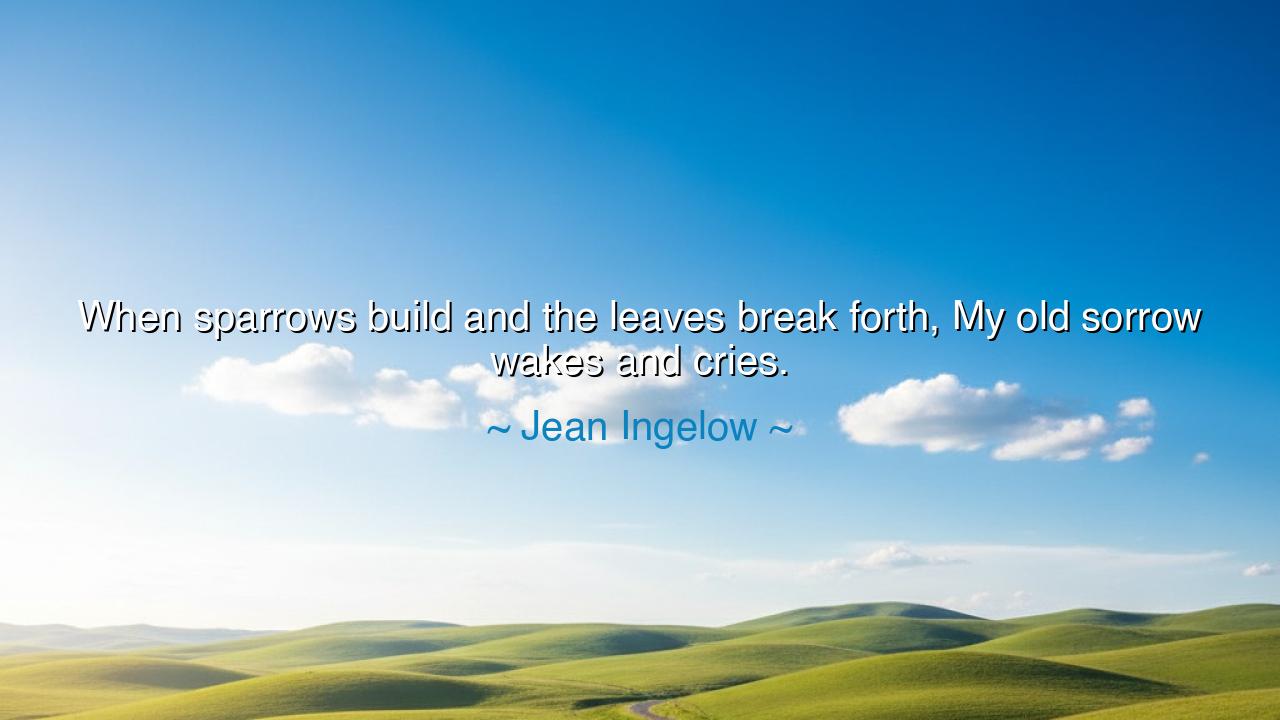
When sparrows build and the leaves break forth, My old sorrow






“When sparrows build and the leaves break forth, my old sorrow wakes and cries.” — thus wrote Jean Ingelow, the poetess of gentle melancholy, whose words sing with the quiet ache of remembrance. In this single line, she captures a truth that every soul comes to know: that grief never truly dies, but sleeps within us, waiting for the season to stir it again. When spring returns — when sparrows weave their nests and green leaves unfurl — the heart remembers what it once lost. The world renews, but within that renewal rises the ghost of sorrow, whispering of all that will never return.
To the ancients, such a truth was no stranger. They too believed that the heart moves in cycles, as the earth does — that joy and sorrow follow one another like day and night. The poet Sophocles wrote that “nothing vast enters the life of mortals without a curse,” meaning that even the beauty of spring may bear the shadow of memory. For when nature awakens, it does not bring only hope — it awakens the echoes of past loves, past dreams, past happiness. Thus, Ingelow’s “old sorrow” is not new grief, but remembered grief, revived by the living pulse of the world around her.
Ingelow, who lived in the 19th century, often wrote of love, faith, and memory — the delicate balance between the divine and the deeply human. She was a poet of emotion restrained by dignity, and her sorrow was never self-pity, but recognition — that time heals, but it does not erase. Her line speaks of a soul who has lived long enough to see seasons repeat, and with them, the pain that once seemed buried. For when sparrows build and the air hums with life, the heart that has known loss cannot help but feel the contrast between renewal and absence — the reminder that what once bloomed in its own life is gone forever.
History, too, gives us a reflection of this truth. Consider Queen Victoria, who, after losing her beloved Prince Albert, lived for decades in mourning. Each spring, as the gardens of Buckingham Palace burst again into life, she felt not comfort but sorrow — the cruel reminder that nature revives, but the dead do not. The flowers that once adorned her youth became symbols of impermanence. And yet, in her grief, there was also reverence — for she learned, as Ingelow teaches, that sorrow, when accepted, becomes a thread that ties the living to the past, the heart to eternity.
There is a strange beauty in this awakening of sorrow. It reminds us that pain, though dormant, is proof of love. The heart that feels sorrow still remembers, and memory is itself a form of faith — faith that what once mattered will never be forgotten. Ingelow’s line teaches that we must not curse this returning ache, but honor it, as one honors an old companion. For sorrow, though sharp, refines the soul. Like spring rain, it nourishes even as it falls — feeding the roots of wisdom and compassion within us.
And yet, her words also whisper of hope concealed within grief. For the same spring that awakens sorrow also awakens beauty. Though the heart aches, it also sees — sees life continuing, light returning, love reborn in new forms. Ingelow’s sorrow does not destroy her; it humbles her before the mystery of renewal. The “sparrows that build” remind her that creation continues — that life, though indifferent to her pain, also offers her the chance to begin again. Her tears, like dew, are part of that same cycle of rebirth.
So, my child, when your old sorrow wakes and cries, do not turn away. Let it speak, for it speaks of love that was real. Walk among the sparrows and the leaves, and know that both your grief and your joy are part of the same divine rhythm. You cannot separate them; they are the two halves of a whole heart. Allow the seasons of your spirit to change as the earth does — to grieve, to rest, to bloom again. For in every sorrow that awakens lies the quiet promise of renewal: that the heart, though wounded, still beats in harmony with the eternal song of life.






AAdministratorAdministrator
Welcome, honored guests. Please leave a comment, we will respond soon